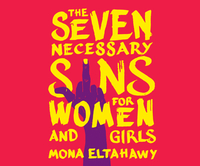Take a photo of a barcode or cover
This is a very impactful book and forced me to rethink my idea of feminism and how to dismantle the patriarchy. However, some of her sources were iffy at best which makes me distrust a lot of the statistics and facts in her book (I have not gone through all of them or anything), which is unfortunate because I really do subscribe to every idea she perpetrates. But overall, I learned a lot and am excited to put this new knowledge to action.
Energico, rabbioso, analiticamente strutturato come suggerisce il titolo: “The 7 Necessary Sins for Women and Girls” è uno dei vari saggi scritti da una donna e attivista POC che tutti dovrebbero leggere per capire le condizioni sociali e geo politiche di cui si occupa il femminismo, quello vero e intersezionale, su grandissima scala.
È stato illuminante tanto quanto scomodo e toccate -sensazioni volute da una scrittura di questo tipo- leggere delle vicende di Mona Althawy, l’autrice di origine egizia che ha dedicato la sua intera vita a combattere per i diritti delle donne, in particolare donne dei suoi stessi territori e matrici culturali, donne che hanno subito la sua stessa violenza -tra stupri, abusi del potere da parte della polizia, attacchi mediatici e il rendersi nemica apertamente di certe figure politiche-, donne musulmane nelle loro pratiche religiose e anche solo condizioni sociali diverse dagli uomini della loro stessa appartenenza, donne e persone queer, donne povere, donne in difficoltà di salute e riconoscimenti.
Dopo un’introduzione biografica fatta di autocoscienza progressiva che l’autrice ha fatto nel suo percorso, di luoghi visitati e in cui ha lasciato messaggi nonostante gli ostacoli della politica, segue la struttura divisa in 7 capitoli: uno per ogni “peccato”, così definito dalla società patriarcale, attribuito alle donne, ri-inventando l’idea dei 7 peccati capitali nel senso che questo mondo gli ha dato; sono dei peccati quotidiani, parole apparentemente semplici che nascondono strutture di disparità di potere, luoghi comuni, riduzioni dell’auto determinazione individuale tanto quanto dell’associazionismo collettivo -che ha fatto tantissimo nelle varie ondate femministe e nei diversi gruppi del movimento, in particolare quelli delle donne dalle origini più marginalizzate-.
Essi sono, per citarne alcuni, “Rabbia”, “Ambizione”, “Profanità”, “Attenzione”, “Lussuria”, tutte quelle cose che nella vita quotidiana siamo state abituate a non ricercare mai o, se espresse, a subire conseguenze che per gli uomini sono completamente inesistenti o anzi li favoriscono.
Ma tutto ciò non è analizzato in modo banale legato ai semplici comportamenti che ripetiamo: ha degli esempi pratici e in eventi in politica, nelle manifestazioni, in diretta TV, sulla stampa, sui social, nei luoghi accademici; lascia quindi dei nomi nero su bianco di tutte quelle donne che hanno provato a “peccare” e, riuscendo in alcuni casi di più o di meno, hanno ugualmente fatto la loro storia per le comunità e i paesi di riferimento.
Ci sono per esempio tanti rimandi alla cultura Pop: ho particolarmente apprezzato, per mia grande passione per lə cantante, la descrizione di un concerto di Halsey del 2018:
“Halsey has said the lyrics about the young woman in “Hurricane,” which she cowrote when she was nineteen, “mean that she [the young woman] will not be victimized. She belongs to no one but herself.” […] “Halsey led the audience in a refrain from the song, “I’m a hurricane”—to which she added “Fuck.”
The force of hundreds of girls and gender-queer pre-teens (Halsey draws a young and queer audience) chanting, “I’m a fucking hurricane! I’m a fucking hurricane!” over and over is revolutionary! The walls shook with the reverberation. The collective power and rage in that concert hall could have gone out that night and torn the patriarchy to bits”
Così come l’importanza della sua dichiarazione di essere apertamente bisessuale nel 2017 -un anno recente eppure ancora molto diverso e più limitato di oggi per la comunità-, con la canzone “Bad at love” così come con “Strangers”, il primo featuring in duetto musicale con un’altra artista bisessuale, Lauren Jarengui, mai fatto nella storia.
…E tante altre storie hanno il loro spazio: oltre i paesi meno curati, riprendendo le lezioni nel passato di grandi attiviste come Angela Davis e Audre Lorde, ma anche creando nuove figure popolari che hanno coordinato proteste tanto in piazza quanto in luoghi interni più burocratici, di difficile accesso. Di tutte queste problematiche, l’autrice riesce a parlare con enorme precisione partendo da parole chiave come quelle dei titoli e mostrando che anche quello che crediamo di sapere, su come sono educate le bambine ad essere viste in un certo modo, a soddisfare gli uomini, a rimpicciolirsi e stare in silenzio, va oltre gli spazi della casa e delle nostre reti sociali: parte da lì nella nostra visuale, ma ha delle basi diffuse in tutto il mondo in diverse situazioni socio-politiche, diversi background storici, diverse possibilità di progredire.
E l’obiettivo del femminismo moderno intersezionale è proprio quello di dare a ogni luogo e comunità gli strumenti per rompere quelle costruzioni.
È un ottimo saggio per iniziare un percorso da una voce oppressa su vari altri aspetti, che quindi dia subito un impatto di cosa è necessario di cui si occupino le lotte ai giorni nostri, ma è anche ottimo per chi sa già molto e vuole approfondire, essendo di un certo numero i dati/nomi/anni/città menzionate; il tutto però è sempre accompagnato da descrizioni scorrevoli, in cui spesso entra il vissuto personale dell’autrice ma al contempo un distacco dato da conoscenze tecniche e antropologiche che, un modo di spiegare i fatti che rimane accessibile, per quanto certe vicende siano comunque molto ricche.
Ma il bello di imparare ogni esigenza che il femminismo si propone di risolvere, è proprio arrivare a sapere anche quelle cose che la nostra educazione -scolastica, personale, in famiglia, politica- non ci ha mai raccontato. E che voci forti come la sua possono invece urlare quanta strada ancora c’è da fare, quanto la modernità non sia ancora perfetta.
Le frasi finali di ogni capitolo sono esortative e speranzose, e soprattutto la conclusione del libro intero:
“Let us celebrate the audacity of teenage girls who save themselves and teenage girls who will save the planet. Let us celebrate teenage girls whose ability to “sin” catapulted them above the derision too often directed toward their cohort.
Let us celebrate women and girls who sin!”
È stato illuminante tanto quanto scomodo e toccate -sensazioni volute da una scrittura di questo tipo- leggere delle vicende di Mona Althawy, l’autrice di origine egizia che ha dedicato la sua intera vita a combattere per i diritti delle donne, in particolare donne dei suoi stessi territori e matrici culturali, donne che hanno subito la sua stessa violenza -tra stupri, abusi del potere da parte della polizia, attacchi mediatici e il rendersi nemica apertamente di certe figure politiche-, donne musulmane nelle loro pratiche religiose e anche solo condizioni sociali diverse dagli uomini della loro stessa appartenenza, donne e persone queer, donne povere, donne in difficoltà di salute e riconoscimenti.
Dopo un’introduzione biografica fatta di autocoscienza progressiva che l’autrice ha fatto nel suo percorso, di luoghi visitati e in cui ha lasciato messaggi nonostante gli ostacoli della politica, segue la struttura divisa in 7 capitoli: uno per ogni “peccato”, così definito dalla società patriarcale, attribuito alle donne, ri-inventando l’idea dei 7 peccati capitali nel senso che questo mondo gli ha dato; sono dei peccati quotidiani, parole apparentemente semplici che nascondono strutture di disparità di potere, luoghi comuni, riduzioni dell’auto determinazione individuale tanto quanto dell’associazionismo collettivo -che ha fatto tantissimo nelle varie ondate femministe e nei diversi gruppi del movimento, in particolare quelli delle donne dalle origini più marginalizzate-.
Essi sono, per citarne alcuni, “Rabbia”, “Ambizione”, “Profanità”, “Attenzione”, “Lussuria”, tutte quelle cose che nella vita quotidiana siamo state abituate a non ricercare mai o, se espresse, a subire conseguenze che per gli uomini sono completamente inesistenti o anzi li favoriscono.
Ma tutto ciò non è analizzato in modo banale legato ai semplici comportamenti che ripetiamo: ha degli esempi pratici e in eventi in politica, nelle manifestazioni, in diretta TV, sulla stampa, sui social, nei luoghi accademici; lascia quindi dei nomi nero su bianco di tutte quelle donne che hanno provato a “peccare” e, riuscendo in alcuni casi di più o di meno, hanno ugualmente fatto la loro storia per le comunità e i paesi di riferimento.
Ci sono per esempio tanti rimandi alla cultura Pop: ho particolarmente apprezzato, per mia grande passione per lə cantante, la descrizione di un concerto di Halsey del 2018:
“Halsey has said the lyrics about the young woman in “Hurricane,” which she cowrote when she was nineteen, “mean that she [the young woman] will not be victimized. She belongs to no one but herself.” […] “Halsey led the audience in a refrain from the song, “I’m a hurricane”—to which she added “Fuck.”
The force of hundreds of girls and gender-queer pre-teens (Halsey draws a young and queer audience) chanting, “I’m a fucking hurricane! I’m a fucking hurricane!” over and over is revolutionary! The walls shook with the reverberation. The collective power and rage in that concert hall could have gone out that night and torn the patriarchy to bits”
Così come l’importanza della sua dichiarazione di essere apertamente bisessuale nel 2017 -un anno recente eppure ancora molto diverso e più limitato di oggi per la comunità-, con la canzone “Bad at love” così come con “Strangers”, il primo featuring in duetto musicale con un’altra artista bisessuale, Lauren Jarengui, mai fatto nella storia.
…E tante altre storie hanno il loro spazio: oltre i paesi meno curati, riprendendo le lezioni nel passato di grandi attiviste come Angela Davis e Audre Lorde, ma anche creando nuove figure popolari che hanno coordinato proteste tanto in piazza quanto in luoghi interni più burocratici, di difficile accesso. Di tutte queste problematiche, l’autrice riesce a parlare con enorme precisione partendo da parole chiave come quelle dei titoli e mostrando che anche quello che crediamo di sapere, su come sono educate le bambine ad essere viste in un certo modo, a soddisfare gli uomini, a rimpicciolirsi e stare in silenzio, va oltre gli spazi della casa e delle nostre reti sociali: parte da lì nella nostra visuale, ma ha delle basi diffuse in tutto il mondo in diverse situazioni socio-politiche, diversi background storici, diverse possibilità di progredire.
E l’obiettivo del femminismo moderno intersezionale è proprio quello di dare a ogni luogo e comunità gli strumenti per rompere quelle costruzioni.
È un ottimo saggio per iniziare un percorso da una voce oppressa su vari altri aspetti, che quindi dia subito un impatto di cosa è necessario di cui si occupino le lotte ai giorni nostri, ma è anche ottimo per chi sa già molto e vuole approfondire, essendo di un certo numero i dati/nomi/anni/città menzionate; il tutto però è sempre accompagnato da descrizioni scorrevoli, in cui spesso entra il vissuto personale dell’autrice ma al contempo un distacco dato da conoscenze tecniche e antropologiche che, un modo di spiegare i fatti che rimane accessibile, per quanto certe vicende siano comunque molto ricche.
Ma il bello di imparare ogni esigenza che il femminismo si propone di risolvere, è proprio arrivare a sapere anche quelle cose che la nostra educazione -scolastica, personale, in famiglia, politica- non ci ha mai raccontato. E che voci forti come la sua possono invece urlare quanta strada ancora c’è da fare, quanto la modernità non sia ancora perfetta.
Le frasi finali di ogni capitolo sono esortative e speranzose, e soprattutto la conclusione del libro intero:
“Let us celebrate the audacity of teenage girls who save themselves and teenage girls who will save the planet. Let us celebrate teenage girls whose ability to “sin” catapulted them above the derision too often directed toward their cohort.
Let us celebrate women and girls who sin!”
Preface: It's always interesting the ways in which "women" are defined in feminist works. Mona Eltahawy consistently claims the extra space to include women AND girls, but only once a chapter will call trans people into the picture. I resonate with womanhood almost exclusively through the lens of victim of patriarchy or product of feminizing socialization. I used to reject feminism outright because of my exclusion, but I've grown to deeply love feminist perspectives, partially as I continue to learn to survive as a worker (blech) navigating wholly patriarchal workplaces much different than my insular, queer social circles of college (sigh) and because, despite my best efforts, I am largely seen and thereby treated as a woman. Feminist works such as these have become indispensable tools in articulating the landscape of gender oppression and its rules of behavior. Naming the products of feminization is a means by which I can free myself from certain traits and/or embrace them oppositionally. It's become easier to read "women" as shorthand in these books, but I continue to urge feminist writers to include queerness and transness more centrally within their frameworks, because it's not just sexism that is thrust upon us, but femininity itself.
Mona Eltahawy embodies so much righteous rage within her politic. She's a fucking badass who's been fighting for international feminist solidarity her whole life. AND some of her points were more compelling than others. I particularly enjoyed the chapter on attention. Attention as a weaponized tool of patriarchy designed to reward and punish is something I witness/experience daily and am grateful for the framework of analysis. Attention as lifesaving tool was a particularly beautiful anecdote.
Her chapters on power and ambition drew distinction between power and ambition that destroy versus uplift patriarchy, but her examples did not. Often the marks of power and ambition were still adjacent to fame, political office, degrees in higher education. In conversations on feminist power, I found Rafia Zakaria's "Against White Feminism" to have a more expansive viewpoint.
The chapter I left most conflicted was on violence (shocker). I think it's an important chapter for people to read. We talk a lot about righteous anger but don't find anger so righteous and Justified when it exits the domain of dialog. Our qualms about violence are regularly lobbied against leftist movements as the state expands the definition of violence to include property destruction and looting. Meanwhile, the court system consistently reifies the right to violent defense as exclusive to men and their property. While reading, I found myself deeply titillated by the vision of a world where men fear us, fear the violent retaliation they could meet from our own hands if they tried to harm us. However, I also had... qualms. I fear individualism and militarism as central tactics to creating a demilitarized world. I believe in restorative justice over retribution. The language of punishment has long been one of police and the courts. And our exclusion from violence is not reason enough to embrace it. Lastly, while many of patriarchy's ills manifest on the body, where violence is a necessary and justified means of defense, its reaches are far broader and its destruction will require more divine feminine than the master's tools.
Mona Eltahawy embodies so much righteous rage within her politic. She's a fucking badass who's been fighting for international feminist solidarity her whole life. AND some of her points were more compelling than others. I particularly enjoyed the chapter on attention. Attention as a weaponized tool of patriarchy designed to reward and punish is something I witness/experience daily and am grateful for the framework of analysis. Attention as lifesaving tool was a particularly beautiful anecdote.
Her chapters on power and ambition drew distinction between power and ambition that destroy versus uplift patriarchy, but her examples did not. Often the marks of power and ambition were still adjacent to fame, political office, degrees in higher education. In conversations on feminist power, I found Rafia Zakaria's "Against White Feminism" to have a more expansive viewpoint.
The chapter I left most conflicted was on violence (shocker). I think it's an important chapter for people to read. We talk a lot about righteous anger but don't find anger so righteous and Justified when it exits the domain of dialog. Our qualms about violence are regularly lobbied against leftist movements as the state expands the definition of violence to include property destruction and looting. Meanwhile, the court system consistently reifies the right to violent defense as exclusive to men and their property. While reading, I found myself deeply titillated by the vision of a world where men fear us, fear the violent retaliation they could meet from our own hands if they tried to harm us. However, I also had... qualms. I fear individualism and militarism as central tactics to creating a demilitarized world. I believe in restorative justice over retribution. The language of punishment has long been one of police and the courts. And our exclusion from violence is not reason enough to embrace it. Lastly, while many of patriarchy's ills manifest on the body, where violence is a necessary and justified means of defense, its reaches are far broader and its destruction will require more divine feminine than the master's tools.
challenging
emotional
informative
reflective
sad
slow-paced
informative
reflective
sad
challenging
informative
inspiring
reflective
fast-paced
3 1/2, I really enjoyed the fact that I had the opportunity to learn about feminists around the world that I was unaware of. I love that she amplified their voices, particularly women of color who are so often overlooked. I also loved the fact that she holds a mirror up to women who uphold patriarchy in favor of their race. I am interested in learning more about the women she discussed and how they are dismantling patriarchy around the world.
informative
inspiring
medium-paced
emotional
inspiring
slow-paced
emotional
informative
inspiring
tense
medium-paced
Moderate: Domestic abuse, Genocide, Sexual violence, Grief







